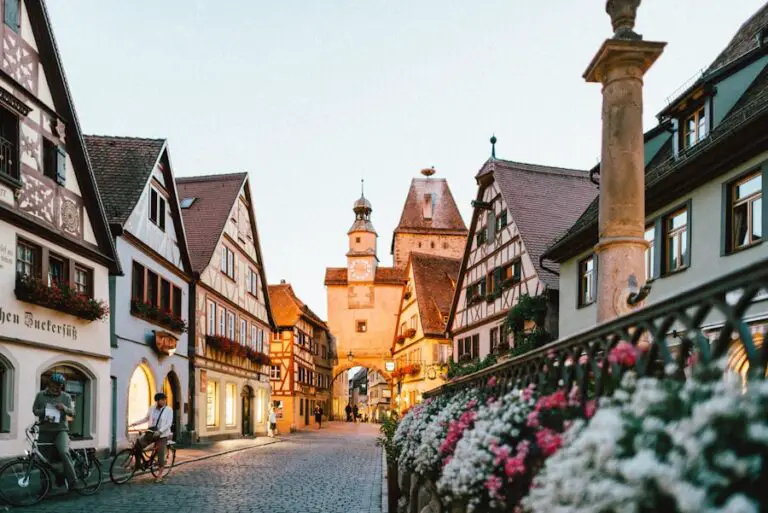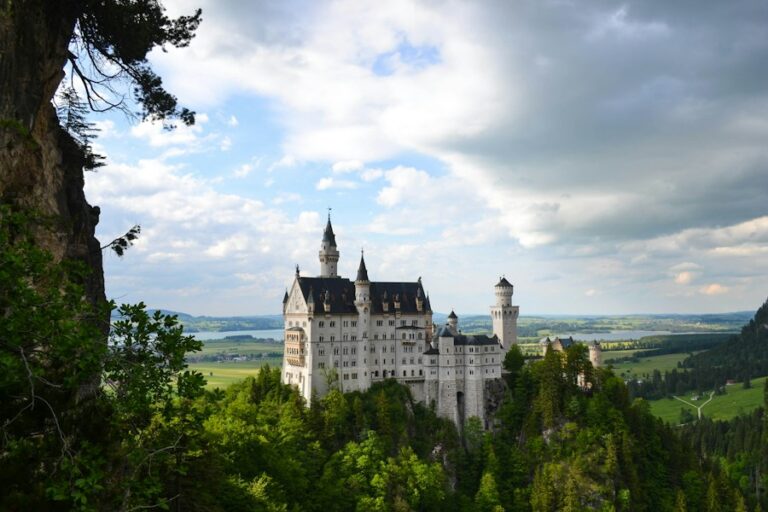From Oktoberfest to Karneval: A Journey Through Germany’s Festivals
Germany is a country known for its rich festival culture, with a wide variety of celebrations that showcase the country’s traditions, customs, and cultural heritage. Festivals play an important role in German culture, bringing people together to celebrate, have fun, and honor their history and traditions. From beer festivals to carnival celebrations to Christmas markets, Germany offers a diverse range of festivals that attract both locals and tourists alike.
The Origins of Oktoberfest: A Celebration of Bavarian Beer
One of the most famous festivals in Germany is Oktoberfest, which originated in Munich in 1810. The festival was initially held to celebrate the marriage of Crown Prince Ludwig and Princess Therese of Saxony-Hildburghausen. The event was so successful that it became an annual tradition, and over time, it evolved into a celebration of Bavarian beer.
Today, Oktoberfest is the largest beer festival in the world, attracting millions of visitors from around the globe. The festival takes place over two weeks in late September and early October and features large beer tents where visitors can enjoy traditional Bavarian beer, as well as live music, dancing, and delicious food.
Bavarian culture plays a significant role in Oktoberfest, with traditional clothing such as lederhosen for men and dirndls for women being commonly worn by attendees. These outfits add to the festive atmosphere and help create a sense of tradition and authenticity.
A Closer Look at Oktoberfest’s Traditions and Customs
Oktoberfest is not just about beer; it also has a range of traditions and customs that make it a unique and memorable experience. One of the most iconic aspects of Oktoberfest is the traditional clothing worn by attendees. Men often wear lederhosen, which are leather shorts or pants with suspenders, while women wear dirndls, which are traditional Bavarian dresses with aprons.
Food and drink are also an essential part of Oktoberfest. Visitors can enjoy a variety of traditional Bavarian dishes, such as pretzels, sausages, and roasted chicken. Of course, the main attraction is the beer, which is brewed according to the German Purity Law and served in large steins.
Music and dancing are another integral part of Oktoberfest. Oompah bands, with their lively brass instruments, provide the soundtrack for the festival, playing traditional Bavarian music that gets everyone on their feet. Folk dances, such as the Schuhplattler, are also performed, adding to the festive atmosphere.
Beyond Oktoberfest: Discovering Germany’s Other Beer Festivals
While Oktoberfest may be the most famous beer festival in Germany, there are many other beer festivals throughout the country that offer a unique and enjoyable experience. These festivals often have their own traditions and customs that set them apart from Oktoberfest.
One example is the Stuttgart Beer Festival, also known as Cannstatter Volksfest. This festival takes place in Stuttgart and is the second-largest beer festival in Germany after Oktoberfest. It features a wide variety of beer tents, amusement rides, and live music, creating a lively and festive atmosphere.
Another notable beer festival is Berlin Beer Week, which takes place in the capital city. This festival celebrates craft beer and showcases the best breweries from Berlin and beyond. Visitors can enjoy tastings, brewery tours, and special events throughout the week.
Each beer festival in Germany has its own unique charm and character, making them worth exploring beyond Oktoberfest.
The Joyous Celebration of Karneval: Germany’s Carnival Season
Karneval, also known as Fasching or Fastnacht, is another significant festival in Germany that is celebrated in various regions across the country. Karneval is a joyous celebration that takes place in the weeks leading up to Lent and is known for its colorful parades, costumes, and parties.
The way Karneval is celebrated varies from region to region in Germany. In Cologne, for example, the festival is known for its elaborate parades and street parties. The highlight of the Cologne Karneval is the Rose Monday Parade, where floats and costumed participants make their way through the city streets, throwing candy and flowers to the crowd.
In Mainz, Karneval is celebrated with a series of events and parties, culminating in the Rosenmontag Parade. This parade features colorful floats, marching bands, and costumed revelers who throw candy and small gifts to the spectators.
Karneval holds great significance in German culture as a time for people to let loose, have fun, and temporarily escape from their everyday lives. It is a time to celebrate and embrace the joyous spirit of community and togetherness.
The History and Significance of Karneval in German Culture
The origins of Karneval can be traced back to ancient pagan traditions that celebrated the end of winter and the beginning of spring. Over time, these celebrations became intertwined with Christian traditions, particularly the period leading up to Lent.
Karneval has both religious and cultural significance in German culture. From a religious perspective, it is a time to indulge in festivities before the solemn period of Lent begins. It is a chance to enjoy oneself before the fasting and reflection that comes with the Christian season of Lent.
From a cultural perspective, Karneval is an opportunity for people to come together as a community and celebrate their shared heritage. It is a time for people to dress up in costumes, participate in parades, and enjoy music, dancing, and laughter. Karneval allows people to express themselves creatively and embrace their playful side.
Over time, Karneval has evolved into a highly anticipated event that brings people from all walks of life together. It has become a symbol of German culture and a celebration of the country’s rich history and traditions.
The Best Places to Experience Karneval in Germany
Germany is home to many vibrant Karneval celebrations, each with its own unique traditions and customs. Here are some of the best places to experience Karneval in Germany:
1. Cologne: Cologne is known for having one of the largest and most famous Karneval celebrations in Germany. The city comes alive with parades, parties, and street performances. The highlight of the Cologne Karneval is the Rose Monday Parade, which attracts thousands of spectators.
2. Mainz: Mainz is another city that is renowned for its Karneval celebrations. The city hosts a series of events and parties leading up to the Rosenmontag Parade, which features elaborate floats, marching bands, and costumed participants.
3. Düsseldorf: Düsseldorf’s Karneval celebrations are known for their unique combination of traditional and modern elements. The city hosts a variety of events, including parades, parties, and costume balls.
4. Rottweil: Rottweil is home to one of the oldest Karneval traditions in Germany. The town’s Narrensprung (Fool’s Jump) is a procession of costumed revelers that dates back over 500 years.
When attending Karneval in Germany, it is important to come prepared with a costume and a sense of fun. Many people dress up in elaborate costumes, so don’t be afraid to get creative and join in the festivities.
The Festive Spirit of Christmas Markets in Germany
Christmas markets are another beloved tradition in Germany that bring people together to celebrate the holiday season. These markets are held throughout the country during the Advent season and offer a wide range of festive activities, food, and drink.
The history of Christmas markets in Germany can be traced back to the Middle Ages when they were held as a way for people to stock up on supplies for the winter. Over time, these markets evolved into a celebration of the holiday season, with vendors selling handmade crafts, decorations, and food.
One of the most famous Christmas markets in Germany is the Nuremberg Christkindlesmarkt. This market dates back to the 16th century and is known for its traditional wooden stalls, gingerbread cookies, and mulled wine. The market also features a children’s program and a daily opening ceremony.
Other notable Christmas markets in Germany include the Dresden Striezelmarkt, which is one of the oldest Christmas markets in the country, and the Cologne Christmas Market, which is known for its impressive cathedral backdrop.
Visiting a Christmas market in Germany is a magical experience. The air is filled with the scent of roasted chestnuts and mulled wine, and the stalls are adorned with twinkling lights and festive decorations. It is a chance to immerse yourself in the holiday spirit and enjoy the traditions and customs of German Christmas.
Exploring Germany’s Wine Festivals: A Toast to Tradition
While beer festivals may be more well-known, Germany also has a rich tradition of wine festivals that celebrate the country’s world-renowned vineyards and winemaking heritage. These festivals offer a unique opportunity to sample a wide variety of German wines and learn about the different regions and grape varieties.
Wine festivals in Germany differ from beer festivals in several ways. While beer festivals are often held in large tents or beer gardens, wine festivals take place in vineyards or town squares. The atmosphere is more relaxed and intimate, with visitors able to stroll through the vineyards or enjoy live music while sipping on a glass of wine.
One example of a wine festival in Germany is the Rheingau Wine Festival, which takes place in Wiesbaden. This festival showcases wines from the Rheingau region, known for its Riesling wines. Visitors can sample wines from local wineries, enjoy live music, and indulge in regional specialties.
Another notable wine festival is the Stuttgart Wine Village, which is held in the heart of the city. This festival features over 120 wine stands, offering a wide variety of wines from the Stuttgart region. Visitors can also enjoy live music, food stalls, and a festive atmosphere.
Attending a wine festival in Germany is a chance to discover the country’s rich winemaking heritage and taste some of the finest wines in the world. It is an opportunity to learn about different grape varieties, winemaking techniques, and the unique terroir of each region.
The Unforgettable Experience of the Berlin Festival of Lights
The Berlin Festival of Lights is an annual event that transforms the city into a dazzling display of light and color. The festival takes place over several weeks in October and features light installations, projections, and interactive displays throughout the city.
The history of the Berlin Festival of Lights dates back to 2004 when it was first held as a way to celebrate the reunification of East and West Berlin. Since then, it has grown into one of the largest light festivals in the world, attracting millions of visitors each year.
During the festival, iconic landmarks such as the Brandenburg Gate, Berlin Cathedral, and the TV Tower are illuminated with stunning light displays. The city’s streets and squares also come alive with colorful projections and interactive installations.
In addition to the light displays, the Berlin Festival of Lights also features a range of cultural events, including concerts, art exhibitions, and guided tours. Visitors can explore the city at night and experience Berlin’s vibrant cultural scene in a unique and memorable way.
Celebrating Germany’s Festivals and Cultural Heritage
Germany’s rich festival culture offers a unique opportunity to experience the country’s traditions, customs, and cultural heritage. From Oktoberfest to Karneval to Christmas markets, each festival provides a glimpse into the vibrant and diverse culture of Germany.
Attending these festivals allows visitors to immerse themselves in German traditions, taste traditional food and drink, and enjoy live music and dancing. It is a chance to celebrate and preserve cultural heritage while creating lasting memories.
Whether you’re sipping on a stein of beer at Oktoberfest, dancing in the streets during Karneval, or strolling through a Christmas market, Germany’s festivals offer an unforgettable experience that should not be missed. So pack your bags, put on your lederhosen or dirndl, and get ready to celebrate Germany’s rich festival culture firsthand. Prost!
Do you have questions about Germany? then contact us by using our Contact Me page. Checkout more posts by us on our Blog.





